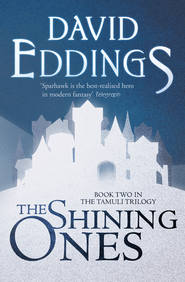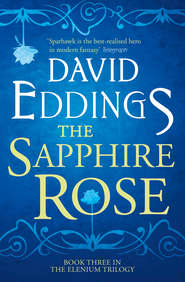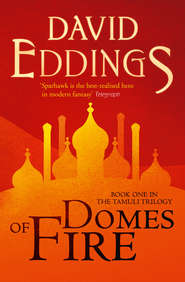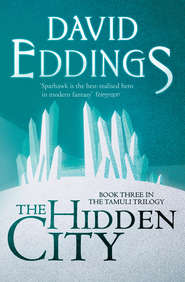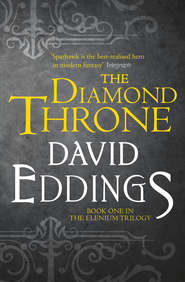По всем вопросам обращайтесь на: info@litportal.ru
(©) 2003-2025.
✖
Belgarath the Sorcerer
Автор
Год написания книги
2019
Настройки чтения
Размер шрифта
Высота строк
Поля
‘Is she quite tame?’ Belsambar asked me. Taming things was a passion with Belsambar; I think he knew half the rabbits and deer in the Vale by their first names, and the birds used to perch on him the way they would have if he’d been a tree.
‘She isn’t tame at all, Belsambar,’ I told him. ‘We met by chance while I was going north, and she decided to tag along.’
‘Most remarkable,’ the wolf said to me. ‘Are they always so full of questions?’
‘How did you know they were asking questions?’
‘You, too? You are as bad as they are.’ That was a maddening habit of hers. If she considered a question unimportant, she simply wouldn’t answer it.
‘It’s the nature of man to ask questions,’ I said a bit defensively.
‘Curious creatures,’ she sniffed, shaking her head. She could also be a mistress of ambiguity.
‘What a wonder,’ Belkira marveled. ‘You’ve learned to converse with the beasts. I pray you, dear brother, instruct me in this art.’
‘I wouldn’t exactly call it an art, Belkira. I took the form of a wolf on my journey to the north. The language of wolves came with the form and remained even after I changed back. It’s no great thing.’
‘I think you might be wrong there, old chap,’ Belmakor said with a thoughtful expression. ‘Learning foreign languages is a very tedious process, you know. I’ve been meaning to learn Ulgo for several years now, but I haven’t gotten around to it. If I were to take the form of an Ulgo for a day or so, it might save me months of study.’
‘You’re lazy, Belmakor,’ Beldin told him bluntly. ‘Besides, it wouldn’t work.’
‘And why not?’
‘Because an Ulgo’s still a man. Belgarath’s wolf doesn’t form words the way we do because she doesn’t think the way we do.’
‘I don’t think the way an Ulgo does either,’ Belmakor objected. ‘I think it would work.’
‘You’re wrong, it wouldn’t.’
That particular argument persisted off and on for about a hundred years. The notion of trying it and finding out one way or the other never occurred to either of them. Now that I think of it, though, it probably did. Neither of them was so stupid that he wouldn’t have thought of it. But they both enjoyed arguing so much that they didn’t want to spoil the fun by settling the issue once and for all.
The wolf curled up and went to sleep while the rest of us waited for the decision of our Master and his brothers about the wayward Torak. When the other Gods came down from the tower, their faces were somber, and they left without speaking to us.
Then Aldur summoned us, and we went upstairs. ‘There will be war,’ our Master told us sadly. ‘Torak must not be permitted to gain full mastery of the Orb. They are of two different purposes and must not be joined, lest the fabric of creation be rent asunder. My brothers have gone to gather their people. Mara and Issa will circle to the east through the lands of the Dals that they might come at Torak from the south of Korim. Nedra and Chaldan will encircle him from the west, and Belar will come at him from the north. We will lay waste his Angaraks until he returns the Orb. Though it rends my heart, it must be so. I will set tasks for each of ye that ye must accomplish in mine absence.’
‘Absence, Master?’ Belzedar asked.
‘I must go even unto Prolgu to consult with UL. The Destinies which drive us all are known, though imperfectly, to him. He will provide guidance for us, that we do not o’erstep certain limits in our war upon our brother.’
The wolf, quite unnoticed, had gone to him and laid her head in his lap. As he spoke to us, he absently – or so I thought at the time – stroked her with an oddly affectionate hand. I knew it was improbable, but I got the strong impression that they somehow already knew each other.
Chapter 6 (#ulink_aa0a043f-775f-537d-ac6c-a86308da032a)
Our Master was a long time at Prolgu, but we had more than enough to keep us occupied, and I’m certain the peoples of the other Gods were just as busy. With the possible exception of the Alorns and the Arends, war was an alien concept to most of the rest of mankind, and even those belligerent people were not very good at the kind of organization necessary to build an army. By and large, the world had been peaceful, and such fights as occasionally broke out tended to involve just a few men pounding on each other with assorted weapons which weren’t really very sophisticated. Fatalities occurred, of course, but I like to think they were accidental most of the time.
This time was obviously going to be different. Whole races were going to be thrown at each other, and nothing had prepared us for that. We relied rather heavily on Belsambar’s knowledge of the Angaraks in the early stages of our planning. That elevated opinion of themselves which Torak had instilled in his people had made them aloof and secretive, and strangers or members of other races were not welcome in their cities. To emphasize that, Angaraks had traditionally walled in their towns. It was not so much that they anticipated war – although Torak himself probably did – but rather that they seemed to feel the need for some visible sign that they were separate from and superior to the rest of mankind.
Beldin sat scowling at the floor after Belsambar had described the wall surrounding the city where he’d been born over a thousand years before. ‘Maybe they’ve discontinued the practice,’ he growled.
‘They hadn’t when I went down to have a look at them five centuries ago,’ Belzedar told him. ‘If anything, the walls around their cities were higher – and thicker.’
Beltira shrugged. ‘What one man can build, another man can tear down.’
‘Not when it’s raining spears and boulders and boiling oil, he can’t,’ Beldin disagreed. ‘I think we can count on the Angaraks to pull back behind those walls when we go after them. They breed like rabbits, but they’re still going to be outnumbered, so they won’t want to meet us in open country. They’ll go into their cities, close the gates, and make us come to them. That’s an excellent way for us to get a lot of people killed. We’ve got to come up with some way to tear those walls down without throwing half of mankind at them.’
‘We could do it ourselves,’ Belkira suggested. ‘As I recall, you translocated a half-acre or so of rocks when you helped Belgarath build his tower.’
‘Those were loose rocks, brother,’ Beldin told him sourly, ‘and it was all I could do to walk the next day. Belsambar says that the Angaraks stick their walls together with mortar. We’d have to take them apart stone by stone.’
‘And they’d be rebuilding them as fast we tore them down,’ Belmakor added. He looked thoughtfully up at the ceiling of Belsambar’s tower where we’d gathered. Then, naturally, considering the fact that it was Belmakor, he reverted to logic. ‘First off, Beldin’s right. We can’t just swarm their cities under. The casualties would be unacceptable,’ He looked around at the rest of us. ‘Do we agree on that?’
We all nodded.
‘Splendid,’ he said dryly. ‘Secondly, if we try to take down their walls with the Will and the Word, we’ll exhaust ourselves and we won’t really accomplish all that much.’
‘What does that leave us?’ Belzedar asked him crossly. I’d picked up a few hints from the others that Belzedar and Belmakor had argued extensively when they’d reached the lands of the Tolnedrans. Belzedar, as second disciple, had assumed that he was in charge. Belmakor, borrowing my authority, had contested that, and Beldin had backed him. Belzedar was mightily offended, I guess, and he seemed to be looking for some way to get back at Belmakor for what he felt to be his humiliation. ‘We can’t strike at Torak directly, you realize,’ he went on. ‘The only way we can hurt him enough to force him to give back the Orb is to hurt his people, and we won’t be able to hurt them if they’re hiding behind those walls.’
‘The situation would seem to call for something mechanical then, wouldn’t you say, old chap?’ Belmakor responded in his most urbanely off-hand tone.
‘Mechanical?’ Belzedar looked baffled.
‘Something that doesn’t bleed, old boy. Something that can reach out from beyond the range of the Angarak spears and knock down those walls.’
‘There isn’t any such thing,’ Belzedar scoffed.
‘Not yet, old chap, not yet, but I rather think Beldin and I can come up with something that’ll turn the trick.’
I’d like to set the record straight at this point. All manner of people have tried to take credit for the invention of siege-engines. The Alorns claim it; the Arends claim it; and the Malloreans certainly claim it; but let’s give credit where credit is due. It was my brothers, Belmakor and Beldin, who built the first ones.
This is not to say that all of their machines worked the way they were supposed to. Their first catapult flew all to pieces the first time they tried to shoot it, and their mobile battering-ram was an absolute disaster, since they couldn’t come up with a way to steer it. It tended to wander away from its intended target and mindlessly bang on unoffending trees – but I digress.
It was at that point in the discussion that our mystical brother, Belsambar, suggested something so horrible that we were all taken aback. ‘Belmakor,’ he said in that self-effacing tone of his, ‘do you think you can really devise something that would throw things long distances?’
‘Of course, old boy,’ Belmakor replied confidently.
‘Why should we throw things at the walls, then? We have no quarrel with the walls. Our quarrel’s with Torak. I’m an Angarak, and I know the mind of Torak better than any of the rest of you. He encourages his Grolims to sacrifice people because it’s a sign that they love him more than they love their fellow man. The more the victim on the altar suffers, the greater he views it as a demonstration of love for him. It’s the specific, individualized pain of the sacrificial victim that satisfies him. We can hurt him best if we make the pain general.’
‘Exactly what did you have in mind, brother?’ Belmakor asked him with a puzzled look.
‘Fire,’ Belsambar told him with dreadful simplicity. ‘Pitch burns, and so does naphtha. Why should we waste our time and the lives of our soldiers attacking walls? Use your excellent engines to loft liquid fire over the walls and into the cities. Trapped by their own walls, the Angaraks will be burned alive, and there won’t be any need for us even to enter their cities, will there?’
‘Belsambar!’ Beltira gasped. ‘That’s horrible!’
‘Yes,’ Belsambar admitted, ‘but as I said, I know the mind of Torak. He fears fire. The Gods can see the future, and Torak sees fire in his. Nothing we could do would cause him more pain. And isn’t that our purpose?’
In the light of what happened later, Belsambar was totally correct, though how he knew is beyond explanation. Torak did fear fire – and with very good reason.
Although Belsambar’s suggestion was eminently practical, we all tried to avoid it. Belmakor and Beldin went into an absolute frenzy of creativity, and the twins no less so. They experimented with weather. They spun hurricanes and tornadoes out of clear blue skies, hoping thereby to blow down the Angarak cities and towns. I concentrated my efforts on assorted illusions. I’d fill the streets of the walled cities of Angarak with unimaginable horrors. I’d drive them out from behind their walls before their mystical kinsman could roast them alive.







